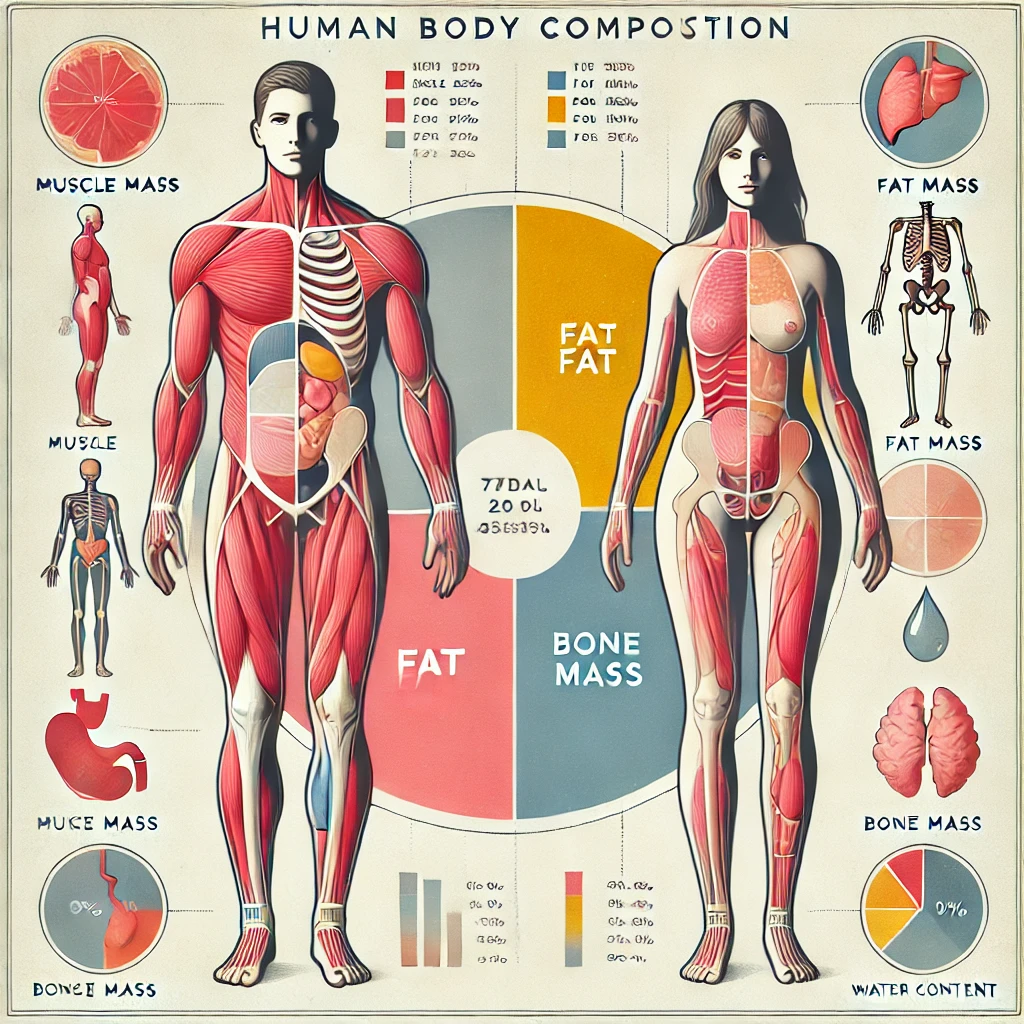Why Your Body Composition Is More Important Than Your Body Weight

Think the Number on the Scale Tells the Whole Story? Think Again.
If you’ve ever stepped on the scale, seen a number you didn’t like, and instantly felt defeated—you’re not alone. But here’s the truth:
The number on the scale does not define your health, your fitness, or your progress.
What really matters? Body composition—the ratio of lean mass (muscle, bone, organs, water) to fat mass in your body. Two people can weigh the same but look, feel, and function completely differently depending on their body composition.
In this blog, we’ll explore why your body composition is far more important than your body weight, how to measure it, and what you can do to improve it—regardless of what the scale says.
What Is Body Composition?
Body composition refers to the percentages of:
- Lean body mass: Includes muscle, bone, water, and organs
- Fat mass: Includes essential and storage fat
It’s possible to be:
- “Skinny fat” – low weight but high body fat, low muscle mass
- “Heavy but fit” – higher weight but high muscle and low fat
- Lean and strong – optimal muscle-to-fat ratio, regardless of total weight
Why the Scale Doesn’t Tell the Whole Story
The scale only shows total mass—not what that mass is made of. It doesn't distinguish between:
- Fat vs. muscle
- Water retention vs. fat gain
- Bone density vs. lean mass loss
So when people say “I want to lose weight,” what they often mean is:
“I want to lose fat, build muscle, and look leaner.”
7 Reasons Why Body Composition Matters More Than Body Weight
1. Muscle Mass Drives Metabolism
Muscle is metabolically active tissue—it burns calories even at rest.
The more muscle you have, the faster your metabolism, the easier it is to maintain a healthy weight and energy level.
Fat burns ~2 calories per pound/day; muscle burns ~6–10 calories per pound/day.
2. You Can Look Leaner Without Losing Weight
Muscle is denser than fat.
So when you build muscle and lose fat at the same time, your body becomes leaner and tighter—even if the scale doesn’t move.
Ever lose 5 inches but gain 2 lbs? That’s body composition at work.
3. Better Body Composition = Better Health Markers
Studies show that higher muscle mass and lower visceral fat are linked to:
- Reduced risk of heart disease and diabetes
- Improved insulin sensitivity
- Lower inflammation
- Longer lifespan
A person with a “normal” BMI but poor body composition (low muscle, high fat) may be at greater health risk than someone classified as “overweight” with high lean mass.
4. Improves Strength, Mobility, and Performance
Lean mass helps you:
- Move more efficiently
- Reduce injury risk
- Improve balance and coordination
- Feel more capable in everyday life
Stronger muscles mean stronger bones, joints, and independence—especially as we age.
5. Fat Distribution Matters More Than Fat Amount
Not all fat is equal. Visceral fat (around organs) is more dangerous than subcutaneous fat (under the skin).
Measuring body composition can tell you where fat is stored—not just how much you have.
A 160 lb person with high visceral fat is at more risk than a 190 lb person with high muscle and subcutaneous fat.
6. It Helps You Set Better Fitness Goals
Focusing on body composition shifts your goals from:
❌ “I want to weigh X”
✅ “I want to build muscle, lose fat, and feel strong”
This mindset promotes sustainable, long-term results, not yo-yo dieting and scale obsession.
7. Improves Confidence and Mental Health
Seeing muscle definition, feeling strong, and knowing you’re healthy—even if the scale hasn’t budged—is empowering.
Ditching the scale can reduce anxiety, increase body satisfaction, and improve self-esteem.
How to Measure Body Composition
You can measure body composition using tools like:
- DEXA scan (most accurate, shows fat, lean mass, and bone density)
- InBody or bioelectrical impedance scales
- Skinfold calipers
- Waist-to-hip ratio (good for visceral fat estimate)
- Progress photos, tape measurements, and clothing fit
While no method is perfect, regular tracking gives you a clearer picture than a number on a scale ever could.
How to Improve Body Composition (Without Obsessing Over Weight)
1. Lift Weights
Resistance training is the most effective way to build lean muscle and burn fat—even after your workout is over.
2. Prioritize Protein
Aim for 0.7–1g of protein per pound of body weight to support muscle repair and growth.
3. Avoid Severe Calorie Restriction
Starving yourself burns muscle along with fat—leading to slower metabolism and worse body composition.
4. Get Quality Sleep
Sleep supports hormone balance, muscle recovery, and fat loss. Aim for 7–9 hours.
5. Reduce Stress
Chronic stress increases cortisol, which encourages fat storage (especially around the belly).
Final Thoughts: Stop Chasing the Scale—Start Building the Body You Want
The scale might show a number, but it doesn’t show:
- Your strength
- Your energy
- Your confidence
- Your health
By shifting your focus from how much you weigh to how much of you is strong, lean, and metabolically active, you unlock real, lasting transformation.
At Sheen Vein & Cosmetics, We Help You Optimize Body Composition—Not Just Weight
Through advanced body composition analysis, hormone optimization, nutritional guidance, and functional fitness strategies, we help you reshape your body from the inside out—no crash diets or scale obsession required.
Book your consultation today and let’s build a stronger, leaner, healthier you.